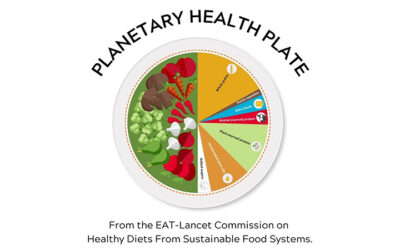 Veggies. Fruit. Whole grains. Legumes. Nuts and Seeds. The staples of a whole-food, plant-based lifestyle! These foods have been foundational to the world’s longest-lived cultures. However, in more modern, Western cultures, we’ve come to favor fast, meaty, cheesy, calorically dense and processed foods and with this, we’re experiencing chronic conditions that are an all too normal part of our lives. Patterns of eating most celebrated for their health benefits generally have a foundation of nutrient-rich whole, plant-based foods in common – and there are numerous benefits to a lifestyle entirely built around plants! Let’s explore.
Veggies. Fruit. Whole grains. Legumes. Nuts and Seeds. The staples of a whole-food, plant-based lifestyle! These foods have been foundational to the world’s longest-lived cultures. However, in more modern, Western cultures, we’ve come to favor fast, meaty, cheesy, calorically dense and processed foods and with this, we’re experiencing chronic conditions that are an all too normal part of our lives. Patterns of eating most celebrated for their health benefits generally have a foundation of nutrient-rich whole, plant-based foods in common – and there are numerous benefits to a lifestyle entirely built around plants! Let’s explore.
What are the benefits of whole plant-based foods?
In addition to a broad range of health-promoting nutrients naturally packed into whole and minimally processed plant-based foods, fiber and phytonutrients are two special nutrients that are only found in plants and they are some of the healthiest nutrients we can feed our bodies.
Some important points to know about fiber:
- Fiber supports gastrointestinal, cardiovascular and immune health.
- 90% of the adults and children in the U.S. are simply not getting the minimum recommended dietary intake for fiber.
- Highly processed and refined foods literally process out nearly all of the highly nutritious and beneficial fiber. So, even though processed foods are often sourced from plants, they can carry health risks and bring the potential for malnutrition and contribute to chronic disease. Fiber is a key element of plant-based foods and it’s best to get it directly from the source!
- One of the most important elements of fiber-rich foods is that they encourage the production of short-chain fatty acids in our gut. Short-chain fatty acids are critical to the healthy functioning of the intestines and have been found to promote better gut health, promote a healthy immune system, and be protective against certain diseases including diabetes and inflammatory bowel diseases.
- Fiber-rich diets have been found to promote a healthier, more diverse and stable human gut microbiome (the village of trillions of bacteria living in our gut!) and promote overall health.
Now for phytonutrients – there are literally thousands of phytochemicals in the wonderful world of plant-based foods and they carry incredible benefits! Some of those health-promoting perks include antioxidant, anti-inflammatory, cancer-fighting, immunity enhancing, disease-preventing, and cholesterol optimizing qualities. The colors of fruits and vegetables indicate different types of health-promoting phytonutrients making it easy to know if you’re getting a variety – it’s important to eat the rainbow!
Powerful health benefits like these, which we can only get from nutrient-rich plant-based foods, bring the opportunity for optimizing health and prioritizing prevention.
What about animal-based foods?
While many commonly-considered “healthy diets” may also be centered around whole plant-based foods, many still include animal-based foods – so what’s the benefit of avoiding or reducing animal-based foods on our plates? There are several factors to consider. While animal-based foods like meat, poultry, fish, dairy and eggs may carry some of the vitamins and nutrients that can also be found in plant-based foods, those isolated nutrients aren’t the full package. Animal-based foods can also include:
- Saturated fats and dietary cholesterol that have been found to promote cardiovascular disease.
- Antibiotics fed to livestock that contributes to antibiotic resistance.
- Insulin Growth Factor-1 which can spur our bodies’ increased production of our own IGF-1 – which can promote unwanted growth in adults and lead to cancer proliferation.
- Heme iron. Excess heme iron has been found to be pro-oxidative (causing internal stress which can lead to cell and tissue damage) and can increase risks for certain diseases such as colorectal cancer and atherosclerosis. It is also considered to be a contributor to increased insulin resistance.
- Chemical compounds that are created from high heat cooking of animal-based foods. These compounds can contribute to chronic disease and systemic inflammation and be pro-oxidative and carcinogenic.
- Carnitine, which can be converted by our bodies to TMAO. At high levels, TMAO has been found to be associated with inflammation, cardiovascular disease, heart attack, stroke, and death.
- Inflammatory factors like Neu5Gc – a compound found in red meat and dairy that can contribute to chronic inflammation and tumor formation.
While there can be some common beneficial nutrients that show up in both plant and animal-based foods, there’s much more to consider as we think about the health impacts of the total package of foods.
Ready to eat more plants?
Here’s what a whole-food, plant-based lifestyle looks like for the typical adult. First,in simple terms:
Over the course of a day, think of half of the foods you eat being fruits and veggies – all types of fruit and a variety of veggies, including starchy, non-starchy, and those wonderful leafy greens. For the other half? Fill the other half of the foods in your day with a mix whole grains like brown rice, quinoa, and whole wheat/whole grain products, about a cup to a cup and a half of legumes like beans, peas, tofu, tempeh and lentils, and add a nutritional boost with a small amount of your favorite raw nuts and seeds!
Need more detailed guidance? We’ve got you covered:
- Vegetables – as many as you like, and be sure to eat a variety of types and colors.
- Fruit – 2-4 servings (1 serving = 1 medium piece or half a cup)
- Whole Grains – 6-11 servings (1 serving = half a cup cooked or 1 slice of whole-grain bread)
- Beans and Other Legumes – 2-3 servings (1 serving = half a cup cooked)
- Nuts (1-2 ounces) and Seeds (1-3 tablespoons)
- Plus optional plant-milks (2-3 cups) and herbs and spices as you like!
What about protein, carbohydrates, fats and specific vitamins and nutrients? With a couple of exceptions (like Vitamin B12), when you eat enough overall calories in whole and minimally processed plant-based foods and focus on a well-planned diet that includes a balance and diversity of plants, it is very easy to get the entire range of vitamins and nutrients needed to optimize our body/organ systems and get energy to take on, not only the day, but a long and healthy life.
Even with this in mind – we know macronutrients and micronutrients are likely on your mind! Will I get enough protein? What about iron and calcium? What else do I need to know? We have two more posts coming in this series to dig deeper into the micros and macros.
Ready to learn more? Check out – Part 2 – Transform Your Health with a Plant-Powered Plate: Micronutrients with local Registered Dietitian Christina Archer.
References:
Hever, J. Plant-Based Diets: A Physician’s Guide. The Permanente Journal. 2016; 20,3: 15-082.
Tomova A, Bukovsky I, Rembert E, et al. The Effects of Vegetarian and Vegan Diets on Gut Microbiota. Front Nutr. 2019;6:47.
Photo by Polina Tankilevitch from Pexels
Research: Planetary Health Plate
An international body of researchers have determined that a primarily plant-based food diet is the most optimal diet...
Zucchini “Meat” Balls
Zucchini “Meat" Balls My husband and I started perfecting this recipe many years ago (more or less 5 years ago). It...
Team Member Spotlight: Esron Gates
A growing network of community members is powering Rooted Santa Barbara - let’s meet the team! Each month we’re...
Supporting Our Work - We’re currently an all-volunteer organization and we see incredible room and need to grow over the coming year. We understand that this time has enormous challenges for everyone, so while we’ll be seeking support to help roll our vision forward, we’re also thinking creatively to keep our costs low to efficiently build resources and deliver programming at low to no cost to our community. If you’d like to support our work, we hope you’ll consider making a donation to one of our giving programs through our community partner, the Santa Barbara Foundation!



